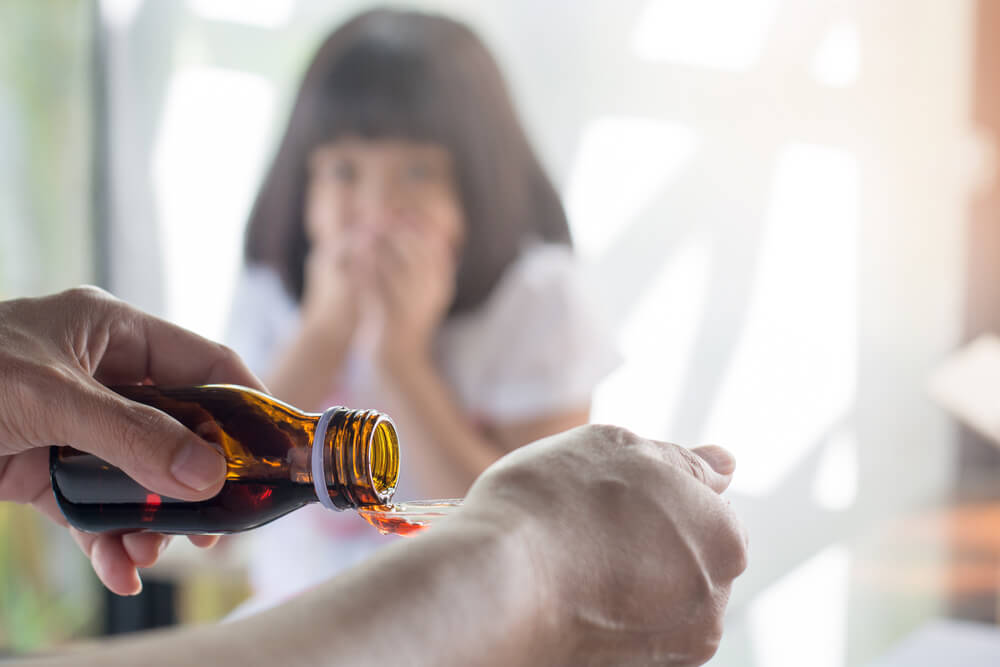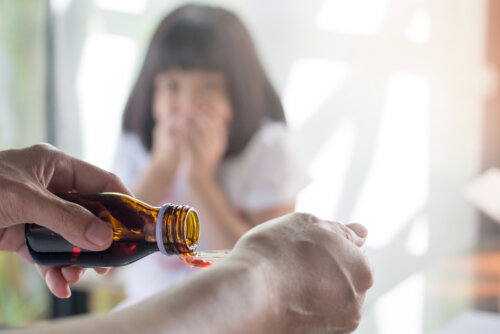Did you know that over-the-counter cough syrup can cause life-threatening side effects for your child? Learn why it’s not recommended for small children.
It is common for children to get 5 to 6 colds a year. Accompanied by nasal congestion, cough and general malaise.Despite bothersome symptoms, pediatricians don’t recommend cough syrup, which is why many parents are wondering Why It’s Bad to Give Cough Syrup to Children.
The recommendations were made by the world’s leading pediatric academies, who revealed the need Avoid cough syrup in children under 6 years of age. This is because there is little scientific evidence of its benefits and possible side effects after consuming them.
Learn below why it’s best to avoid these medications, the side effects they can cause, and some alternative ways to treat your child’s cough. continue reading.
What is a cough?
cough definition For example, by violently expelling air, the body attempts to release secretions and foreign substances that have invaded the respiratory tract by expelling air. This occurs when the nerves in these tissues are stimulated by foreign substances.
There are different types of coughs, whose characteristics depend on the cause and the area of the respiratory system affected. These include the following.
- dry cough: Also called a dry cough. Phlegm-free cough is usually caused by upper respiratory tract inflammation, allergies, foreign body inhalation, etc.
- Cough with phlegm: It is what is called a productive cough because it is accompanied by mucus secretion. It is caused by bacteria and viruses invading the respiratory tract.
- Cough with wheezing: It is a dry cough that is accompanied by a characteristic whistling sound when exhaling. It is caused by inflammation of the bronchial tree, like bronchitis.
Coughing is a defense mechanism of the respiratory system and its function is to keep the airways open.So use cough syrup to stop it completely It disrupts the body’s natural steps to treat respiratory illnesses.
Even using cough syrup can cause other lung complications that can endanger your child’s life. therefore, Syrups should be avoided in childrenunless the pediatrician deems it necessary based on the child’s condition.
Do children’s cough syrups work?
Cough syrups are medications designed to reduce the duration and severity of a cough. There are different types depending on the condition you want to treat, including the following.
- Antitussives: Coughing is reduced.
- Mucolytics: They are responsible for dissolving bronchial secretions.
- Expectorants: They fluidize secretions so they can pass out more quickly.
Although many are sold casually on the premise of relieving coughs and secretions, There is no scientific evidence to support its effectiveness in treating coughs and colds.
A study published by the Cochrane Library details that there is insufficient evidence to support or refute the effectiveness of over-the-counter medications for treating acute coughs. This should be taken into consideration when considering prescribing antihistamines and centrally active antitussives to children..
Why is it bad to give your child cough syrup?
However, The use of cough syrup in children is considered harmful because the risks outweigh the possible benefits. Cough syrups, such as antitussives, mucolytics, and expectorants, may cause side effects when consumed. This is especially true for children under the age of two.
On the other hand, coughing also plays an important role in solving respiratory problems. In the case of a cold, if a child is given cough medicine, there is a risk that secretions will become lodged in the lungs and develop pneumonia.
If you use a mucolytic or expectorant, you may not have the desired effect, but you may experience side effects such as drowsiness, hives, seizures, etc.
As a result, the world’s leading health agencies recommend against its use.The Australian Department of Health states Children under 6 years old should not take medicines to treat cough. and cold symptoms.
For its part, the American Academy of Pediatrics does not recommend the use of over-the-counter medications to treat cough and cold symptoms in children younger than 4 years old.By the same token, the Spanish Pediatric Association points out that cough or cold medicine They are not indicated and can be harmful when you have a cold.
Regardless, it is necessary for the pediatrician to evaluate the source of the cough (cold, allergies, bronchiolitis, etc.) and make a judgment accordingly. Indicate the specific treatment that causes this symptom.
Cough syrup side effects in children
Syrups used to treat coughs and colds can be harmful and increase the risk of serious or fatal side effects in children. This happens when you take more than the recommended dose each day or take two or more medicines that contain the same active ingredient.
Adverse effects vary and depend on the active ingredients of the cough syrup the child consumes. The Spanish Association of Primary Care Pediatrics details the following.
- Respiratory depression (codeine).
- Seizures (Terpene Derivatives).
- Addiction (codeine, dextromethorphan).
- Constipation (codeine, dextromethorphan)
- Drowsiness (codeine, dexmedtropane, cloperastine, levopropazine).
In this sense, codeine is one of the antitussives that has the greatest negative impact on children, Therefore, its use is prohibited for children under 12 years of age (even pregnant women). When this drug enters the body, it is converted to morphine, which can cause toxicity and increase the risk of respiratory depression.
among children ultra-rapid metabolizerThat is, they break down the drug quickly, producing doses of morphine that can be fatal.
To avoid such adverse effects on children, care must be taken Do not give your child medications without consulting your pediatrician. Also adjust strictly to the recommended daily dose.
How to safely treat cough in children?
The U.S. Food and Drug Administration explains some recommendations for relieving cough and cold symptoms in infants and children. These include the following.
- Use a cool mist humidifier. This can reduce nasal congestion and make breathing easier.
- Use nose drops or saline spray Keep nasal passages moist and prevent nasal congestion.
- Use nasal suction technique Use a bulb syringe or similar product with or without saline nose drops.
- Provide acetaminophen or ibuprofen Treat symptoms such as fever, malaise, and pain.
- Encourage children to drink more water So they stay hydrated.
One of the most well-known natural remedies for cough relief is honey.A study published in the journal pediatric law Detailed description Honey is an alternative for cough relief in children over 12 months old. The dosage is not critical, but the most common practice seems to be half a teaspoon to a teaspoon with warm water at night before bed.
Consult a pediatrician
Coughing can affect your child’s daily activities and rest. Therefore, many parents feel the need to provide them with over-the-counter cough syrup to relieve this uncomfortable symptom. despite this, The cough usually gets better on its own when the cause is addressed.
When you have a cold, Cough medicine won’t help make it go away faster. On the contrary, its use can bring about a series of adverse effects that damage children’s health.
If you have any questions about your child’s cough, it is recommended that you consult your pediatrician and seek his or her approval before offering any medication. It should be noted that home remedies can help with natural treatment.
you might be interested…


